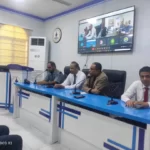General Medicine & Surgery
Overview Of General Medicine & Surgery
A preparatory committee was formed to study the possibility of establishing a faculty of medicine at Hadhramout University (HU). The committee decided to start the teaching process in the academic year 1997 / 1998. Therefore, the Faculty received the first batch of students in September of the same year and graduated in August 2003. After that, 2 academic programs were launched at the Faculty : Doctor of Pharmacy (Pharm D) in 2012, and Medical Laboratory in 2013. The graduates are granted Bachelor Degree in the following fields:
- General Medicine & Surgery.
- Pharmacy.
- Medical Laboratories.
Vision
Mission
Objectives
- To qualify the graduates to be psychologically prepared and well-behaved to work efficiently in the field of therapeutic, preventive and rehabilitative health care.
- To create the integrated personality of the graduate, and develop his/her ability to collect, analyze, conclude and solve health problems in the society as well as to think independently and to make the appropriate decision.
- To develop the graduates through work and life-long learning programs.
- To activate and direct the scientific research towards health problems in the region, and to use its results that are related to society.
- To contribute effectively by its students and academic staff as well as provide and develop direct health services for social development.
- To instill values and genuine humane achievements of the Arab Islamic Civilization into the graduate as a motive to build the future as well as develop the spirit and faith of the Arab nation future in order to make the graduate capable of facing and solving society problems.
Faculty’s Programs
Curriculum For Community Medicine Department
Doctoral Program in Public Health
Curriculum For Family Medicine Department
Master’s Program in Family Medicine
Study Plan
Study Plan
Master Program of Family Medicine
- Mater Degree Requirements (According to the regulations of the University ).
- The study plan for the preparatory year of the program with the number of credit hours for each course.
- Thesis title registration, supervision, defense and specification of thesis ( according to the regulations of the University).
The student studying courses and a thesis by total credit 54 hours distributed as follows
| Year | Semester | Code | Course |
Credit hours |
|||
|
First Year*
|
First semester |
FMD1 |
طب الأسرة – الجزء الأول Family Medicine Part One |
2 |
|||
|
FMD2 |
صحة الطفل 1 Child health – Part One |
8 |
|||||
|
FMD3 |
صحة الكبار1 Adult Health |
8 |
|||||
| Total |
18 |
||||||
|
Second semester |
FMD4 |
طب المجتمع – الجزء الأول Community Medicine Part One |
2 |
||||
| FMD5 |
صحة الام Maternal Health |
8 |
|||||
| FMD6 |
الجراحة Surgery |
8 |
|||||
| Total |
18 |
||||||
|
|
Third semester |
FMM1 |
طب الآسرة – الجزء الثاني Family Medicine – Part Two |
2 |
|||
| FMM2 |
صحة الطفل 2 Child Health- Part Two |
5 |
|||||
| FMM3 |
صحة الكبار 2 Adult Health – Part Two |
5 |
|||||
| FMM4 |
صحة المرأة Women Health |
2 |
|||||
| FMM5 |
طب الطوارئ Emergency Medicine |
4 |
|||||
| Total |
18 |
||||||
| Total for the first year |
54 |
||||||
Curriculum For Community Medicine Department
Master’s Program in Public Health
Study Plan
Study Plan
Master Program of Family Medicine
- Mater Degree Requirements (According to the regulations of the University ).
- The study plan for the preparatory year of the program with the number of credit hours for each course.
- Thesis title registration, supervision, defense and specification of thesis ( according to the regulations of the University).
The student studying courses and a thesis by total credit 54 hours distributed as follows
| Year | Semester | Code | Course |
Credit hours |
|||
|
First Year*
|
First semester |
FMD1 |
طب الأسرة – الجزء الأول Family Medicine Part One |
2 |
|||
|
FMD2 |
صحة الطفل 1 Child health – Part One |
8 |
|||||
|
FMD3 |
صحة الكبار1 Adult Health |
8 |
|||||
| Total |
18 |
||||||
|
Second semester |
FMD4 |
طب المجتمع – الجزء الأول Community Medicine Part One |
2 |
||||
| FMD5 |
صحة الام Maternal Health |
8 |
|||||
| FMD6 |
الجراحة Surgery |
8 |
|||||
| Total |
18 |
||||||
|
|
Third semester |
FMM1 |
طب الآسرة – الجزء الثاني Family Medicine – Part Two |
2 |
|||
| FMM2 |
صحة الطفل 2 Child Health- Part Two |
5 |
|||||
| FMM3 |
صحة الكبار 2 Adult Health – Part Two |
5 |
|||||
| FMM4 |
صحة المرأة Women Health |
2 |
|||||
| FMM5 |
طب الطوارئ Emergency Medicine |
4 |
|||||
| Total |
18 |
||||||
| Total for the first year |
54 |
||||||
Curriculum For Internal Medicine Department
Fellowship Program in Cardiology Fellowship
Description of Courses :
(First level)
Introduction to Medicine and Emergency
Human and Environment
Maternity and Childhood
(Second level)
Pathology
Hematology
Circulatory and Respiratory Systems
Community Medicine 1




